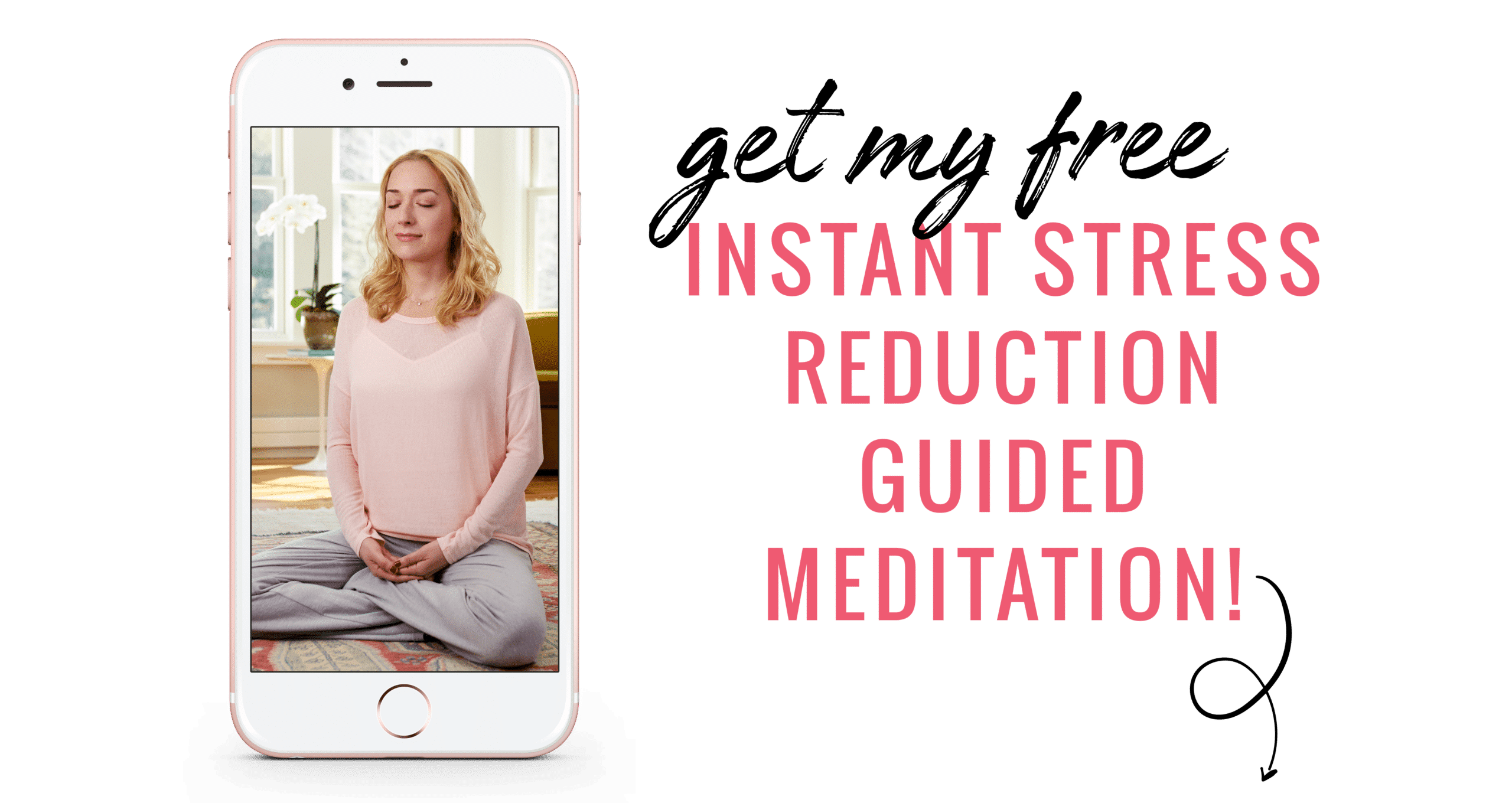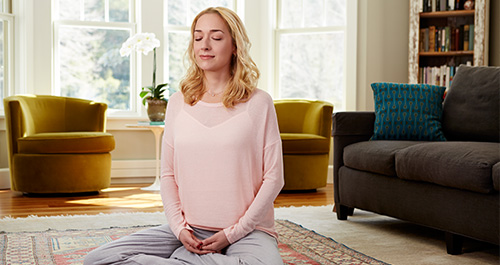Hiya Gorgeous!
Getting enough sleep is a challenge for many of us. In America, an estimated 40 percent of adults aren’t getting the recommended minimum of 7 hr per night. And because we know that sleep is so essential to our overall well-being (that’s why it’s one of my five pillars of wellness!), we’re always looking for ways to get more of it.
I don’t know about you, but I love reading and writing about new ways to hack my routine to promote maximum rest. I do my best to practice good sleep hygiene by leaving my phone out of the bedroom, keeping the room dark and cool, using relaxing essential oils, avoiding caffeine in the afternoon… the list goes on! We’ve chatted about many of these tips and tricks here on kriscarr.com, but there’s an important piece of the puzzle that we haven’t covered yet: what we’re sleeping on.
Whenever I post a new blog about sleep, I get lots of requests for more info finding the right mattress. And lately I’ve been getting more Qs about eco-friendly and organic mattresses: where to find them, what to look for, how to find trustworthy brands, etc. Well dear friends, I heard you loud and clear—that’s what today’s blog is all about!
Pssst! Before you continue, grab this little gift from me. It’s a free guided meditation that’ll help you melt stress in minutes and get in the mindset for sleep. Mwah!
Are you sleeping with toxins?
Did you know that many standard mattresses are filled with harmful toxins? They often contain chemical flame retardants, petroleum-based latex and foam, vinyl made with phthalates and heavy metals, and more. These materials don’t just sound scary—prolonged exposure to them can lead to serious health issues like certain cancers and damage to the central nervous system (read more in this article).
The gross chemicals and materials used to make mattresses aren’t just bad for our bodies—they’re also really bad for our planet. And the companies manufacturing them often don’t use sustainable practices, which means they end up seeping out into the environment and wreaking havoc on our precious planet.
We don’t tolerate this kind of crap in our food, so why should we allow it into our bedrooms? Our bedrooms are our sanctuaries—where we rest, dream, have sex, snuggle… That sacred environment should be free of nasty invaders (and I’m not just talkin’ about the dust bunnies hanging out under the bed!).
You might be thinking: “Ok, Kris, point taken! So how do I find a mattress I can actually feel good about?” Well tootsie, I’m just getting started!
Making sense of organic mattress labels
So you’ve decided to get a non-toxic mattress… now what? When you start your search, you might find that trying to decode the labels and info on mattress companies’ websites makes your head spin. For example, you’ll notice that there are a variety of certifications brands can get to show they use organic materials, maintain fair working conditions, have sustainable manufacturing practices, etc. As awesome as that is, it can be pretty hard to keep track of what all the they all mean—and which are truly impactful when it comes to protecting people, animals and our planet.
Here are a few tips for understanding certifications when shopping for an organic mattress:
- According to Consumer Reports, GOTS (Global Organic Textile Standard) and GOLS (Global Organic Latex Standard) are the two most meaningful certifications for mattresses. GOTS means that at least 95 percent of the materials are certified organic and there are restrictions on the other 5 percent (no chemical flame retardants here!). If you’re getting a mattress made with latex, look for the GOLS certification to ensure that it’s 95 percent organic latex.
- Oeko-Tex Standard 100 is another good certification to look for in an organic mattress. It sets limits on the emission of harmful chemicals during the manufacturing process and bans the use of nasty dyes, flame retardants, etc. But here’s something to keep in mind: Just because a mattress has this certification doesn’t mean it’s made of organic fibers. Learn more about the Oeko-Tex Standard 100 certification here.
- Some other certifications you’ll see during your quest for the perfect organic mattress are: CertiPUR-US, Greenguard and Organic Standard 100. And while these certifications have value, they’re limited because they don’t cover raw materials.
- You might not think to check your mattress for animal products, but you should! Many contain wool, which is often far from cruelty-free (to learn more about the problems with the wool industry, check out my article about fast fashion). My team and I found a bunch of eco-friendly mattress companies that don’t use animal products, but very few that are Certified Vegan (learn more about what that means here). I hope this certification gets more attention from mattress companies in the future!
A few more eco-friendly mattress tips to keep in mind…
Here are some of the other details to take into account during your search for the perfect mattress:
- Just because a company says its mattresses are organic doesn’t necessarily mean they’re 100 percent organic. Some of the materials may be organic, but this term is often used freely and without much discretion. That’s why it’s so important to do your research and read up on the materials in any mattress you consider buying. Conscious consumption is the name of the game!
- And on that note, watch out for the word “natural.” That’s not to say it’s meaningless. But as is true for food labeling, there are no standard requirements a company needs to meet to slap that word all over its products.
- One exciting way the mattress market is changing is through the increasing popularity of a direct-to-consumer model. That means companies are cutting down on costs by selling directly to you (no furniture or mattress store in the middle). And they’re able to pass these savings on to you through better prices. Wahoo!
Organic mattress brands to check out!
My team and I found tons of eco-friendly, organic mattress brands. Here are a few that really stood out from the pack!
- Avocado handmakes non-toxic, organic mattresses in California. Their vegan-friendly option is made with organic cotton instead of wool, and I’ve just gotta give these guys an extra shout-out because theirs was the only Certified Vegan mattress we found. Love that!
- PlushBeds offers a vegan-friendly mattress made with natural latex, organic cotton and their proprietary Eco Fire Barrier, which is a flame-resistant layer derived from natural plant fibers. So cool… what CAN’T plants do?!
- Bear’s mattresses are designed to promote faster recovery and increased performance for athletes (of all levels and kinds—we’re not just talking about Olympians here!). One of their innovative materials, Celliant, helps regulate body temperature, enhances tissue oxygen levels and harnesses your body’s natural energy to speed up recovery time. Yes, please!
- You can get Tuft & Needle’s original queen mattress for $595. If you’ve ever shopped for a mattress before, then you know how much of a bargain that is—especially for one that’s high-quality and environmentally friendly. Plus, they’ve donated over $9 million in mattresses back to the community through their forward-thinking return policy. Three cheers (or should I say Zzzs?) for mattress companies that give back!
- Purple believes that life is too short to be uncomfortable, and I have to agree! Their innovative mattresses adapt to your body to give you the perfect level of support. They’re also non-toxic, hypoallergenic, temperature-regulating and made in the US.
And that’s just to name a few! There are so many great brands out there doing their part to improve your sleep and protect the environment at the same time. In addition to those mentioned above, I recommend checking out Saatva, Loom & Leaf, Leesa, Brentwood Home, Nest and Nectar. I also found plenty of helpful resources out there to support your research, including this one and this one.
Sweet dreams, sweetheart!
The right mattress can be the difference between 8 hr of tossing and 8 hr of restorative snoozing. I hope these tips help you find an organic mattress that allows you to rest easy knowing it’s safe for you, your home, kids and fur kids, and the environment.
Your turn: Do you have other sleep-related challenges or questions you’d like me to write about? I’m always looking to add more to the growing library of sleep resources on kriscarr.com, so please share your ideas and Qs in the comments below!
Peace & mindful mattresses,

Meditation can help you quiet those racing thoughts and get into a restful mindset. My Self-Care for Busy People album has guided tracks to help you relax any time of day (including evening and sleep hygiene meditations!). Get the album here!











Thank you Kris, this was great! Have you looked into the IntelliBed? It’s not organic but claims it’s non-toxic. I’m curious about it since it has great reviews. Thanks!
Hey Annie! I don’t know about IntelliBed, but non-toxic is a great start! You can always reach out to their customer service team if you have questions that aren’t answered on the website—we did that while doing the research for this article and found it very helpful :). Let us know what you find out! xo
Thank you so much for doing this research for us, Kris. You are my trusted resource for EVERYTHING!!! 🙂
It was my pleasure, Jenny! I love researching and sharing this kind of info. So glad I can be a resource for you. Mwah!
Yes, I love ❤️ your trusted word.
Hope to find the right mattress in Canada
Do you know of any company?
Hi Pauline! I think many of the brands I mention in this article ship to Canada (Leesa, Tuft & Needle and Saatva, just to name three!). I’d just narrow down which options you’re interested in and then look at the FAQs on their website/speak with their customer service to find out about shipping costs. Happy mattress hunting! xo
Dear Kris,
Since you requested ideas about getting good sleep, may I please share with you my technique for getting back to sleep?
When I wake up in the night and can’t get back to sleep, I do the following. IT ALWAYS WORKS!
I use our beloved Louise Hay’s affirmations from the You Can Heal Your Life list. I have about six to ten affirmations (or more) that feel just right for me.
1) I begin by repeating several times “I am willing to release the pattern in my consciousness that is creating this condition.”
2) Then I take my first affirmation and keep repeating it until it feels “done.”
3) Then I repeat Steps 1 and 2 for the next affirmation.
4) I continue doing this for every affirmation… And I fall asleep even before finishing all of the affirmations! They are so comforting–they soothe the mind and body and soul.
Louise continues to bless us in so many ways.
Thanks and blessings to you, too!
Love this, Linda! Thanks to you (and Louise <3) for sharing—I'm sure a lot of other people here will find it helpful. xo!
Lifekind has a great reputation and a long history of clean bedding, mattresses etc. Please check them out as well.
Thanks for the tip, Susi! xo
So, will eventually be in the market for a new mattress, but right now, as we push our faces into out pillows every night, I could learn a lot more about pillows and what to look for (finding the skinniest one possible is my unending quest at the moment). Any thoughts on healthy pillows?
Hey Patty! Great question. I haven’t looked into eco-friendly pillows yet (maybe a future blog?), but I believe some of the brands I listed in this article have options. One my team members who also likes her pillows thin mentioned that she uses travel pillows! xo
I have an autoimmune condition I’m trying to heal. Sometimes it’s hard to sleep because of the discomfort of my body. Any herbal or other suggestions? Thanks Kris! ❤️
I have several other sleep-related blog posts that I think you’ll find helpful. I’d suggest starting with this one: https://go.kriscarr.com/blog/sleep-hygiene-guide/. Or just search for “sleep” here on the site and you’ll get lots of options. I hope you find them helpful. Sending you lots of love!
Thank you, Kris! What are your thoughts on Winkbed? I have been leaning towards purchasing from them, as I am a heavier side sleeper who needs both cushion and stability.
Hey Sammy! I’m not familiar with Winkbed. I’d definitely use the guidance in this article to check out what certifications they have (if any), what materials they use, etc. In my experience, if a company has eco-friendly practices, they’re excited to talk about it. If they don’t mention it, there might be something worth investigating. Hope that helps. xo!
Hi there! Did the team look into Awara?
We didn’t, but I see that they use GOLS-certified organic latex, which is a great start! That said, it looks like one layer of the mattress is a cotton-woo blend, which isn’t for me (as a vegan, I don’t use wool). But if you end up learning more about them, let us know what you think 🙂 xo!
Hi lovely Kriss, these seem just what is needed for a 60yr old fibromyalgia client with temperature regulation problems, pain and sore joints. Really could use some advice on suppliers, do they have a UK outlet?
Hi Alison, glad you found the article helpful and think the right mattress for you might be on this list. (Almost) all of the mattresses I mentioned use a direct-to-consumer model, so they don’t work with third-party suppliers. The exception is Leesa, which you can buy from the company OR from west elm. I know Leesa ships to the UK and west elm likely does too. If you’re interested in the other brands, I encourage you to reach out to their customer service teams—they were all very helpful when we reached out with questions during our research phase. Hope this helps and sending you lots of love!
Hi Kris, I am so curious if you have any tips. I bought an organic latex mattress, but so hard to find nice tight fitting sheets. Do you have any brands you have found to fit these smaller and thinner mattresses? thank you!! so curious!!
Adriana
For many years we have slept comfortably on a no wave water bed. We need a new one and I do not like the idea of all the out gassing. I’ve tried conventional type mattresses but cannot get a good nights sleep on them. Have you found any safe water bed companies?
Hey Jan! This is Jennifer from Team Crazy Sexy. Kris hasn’t looked into waterbed options but we’ll add that as a future idea if she reviews this blog. Thank you!